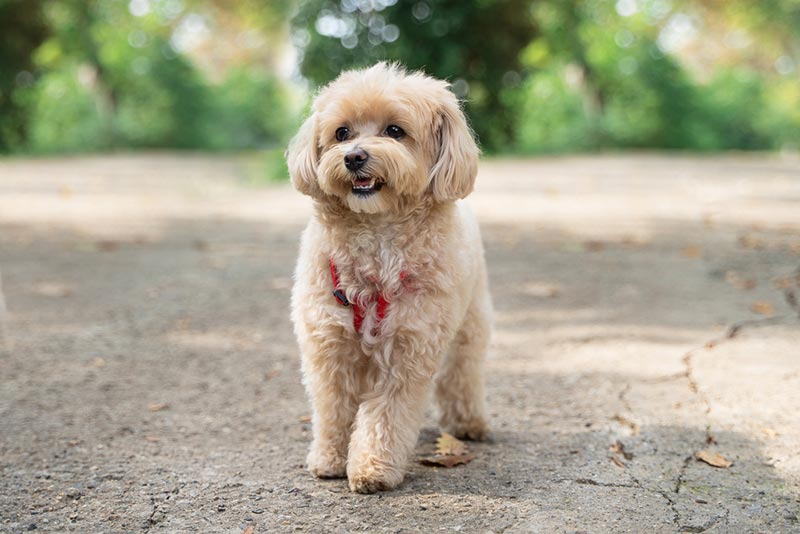Why Is My Doberman So Skinny? 13 Vet Reviewed Reasons

Updated on
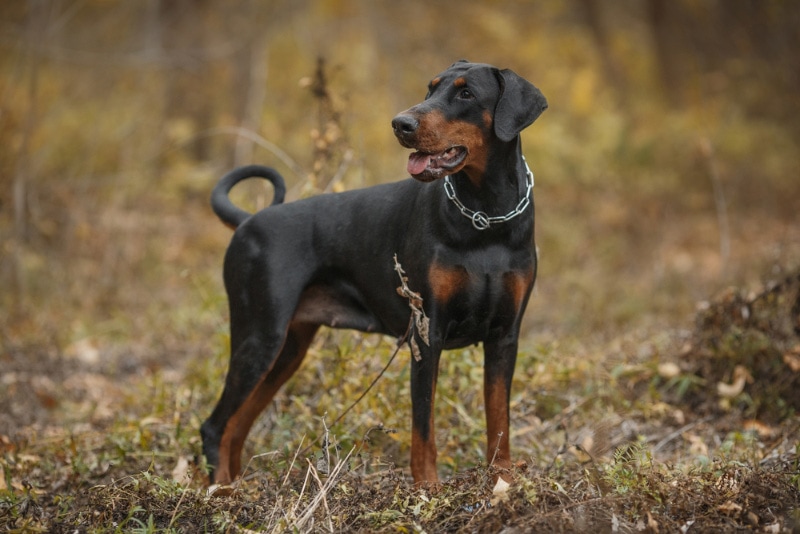
Dobermans are large, strong dogs with a sleek build. However, as a concerned owner, you may wonder why your Doberman is suddenly losing a lot of weight or appearing skinnier than usual.
Your Doberman looking a little thin can be due to several reasons. Some are more common, such as an increase in their exercise levels resulting in weight loss, and some may be less common and more serious such as muscle wasting due to organ disease.
In this article, we look at 15 reasons why your Doberman is so skinny, but we would always advise in all cases to see your vet if you’re concerned.
The 13 Reasons Why Your Doberman Looks Too Skinny
1. Not Enough Calories for Their Size or Exercise Needs
Dobermans can lose weight if they don’t take in enough calories for their size or exercise needs. A two-year-old Dobie should weigh 60 to 100 pounds, and dogs who exercise an average amount need around 4 to 7 cups of food per day.
This amount is flexible, as working dogs (like police dogs) will need more calories as they expend more energy. The more fuel burned, the more calories are required. If the energy requirement is not met, your Doberman will lose weight.
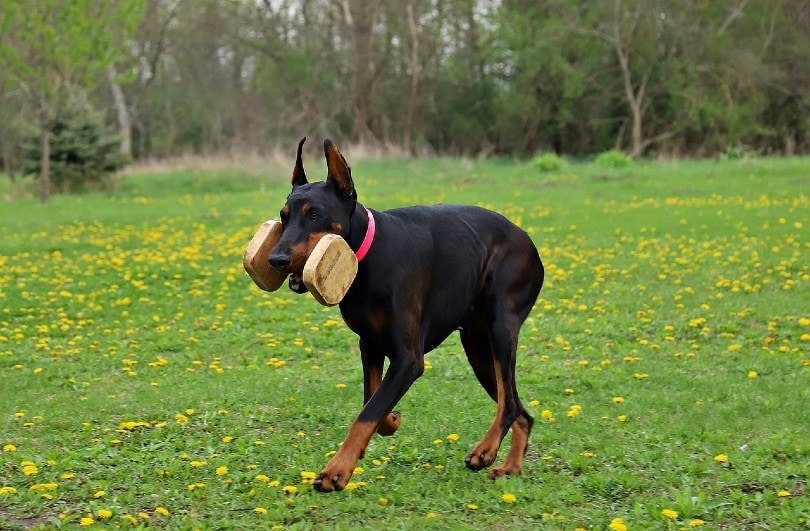
2. Muscle Wasting
Muscle atrophy or muscle wasting is often caused by a lack of use of the muscles or by old age. Muscle wasting is common in the hind legs of elderly dogs, giving them a slimmer appearance.
Muscle atrophy can signify a more severe illness such as kidney, liver, or heart disease, so discuss any concerns with your vet. A slow build-up of exercises and a nutritious diet can help your Dobie rebuild their muscles and support their weight into old age.
3. Dental Disease
Dental disease causes signs including swelling of the gums, redness, and pain. Unfortunately, dental disease is prevalent in dogs; over 80% of dogs over the age of 3 have some form of dental disease. This can cause pain that’s severe enough to cause dogs to stop eating.
- Teeth chattering
- Bad breath (halitosis)
- Drooling
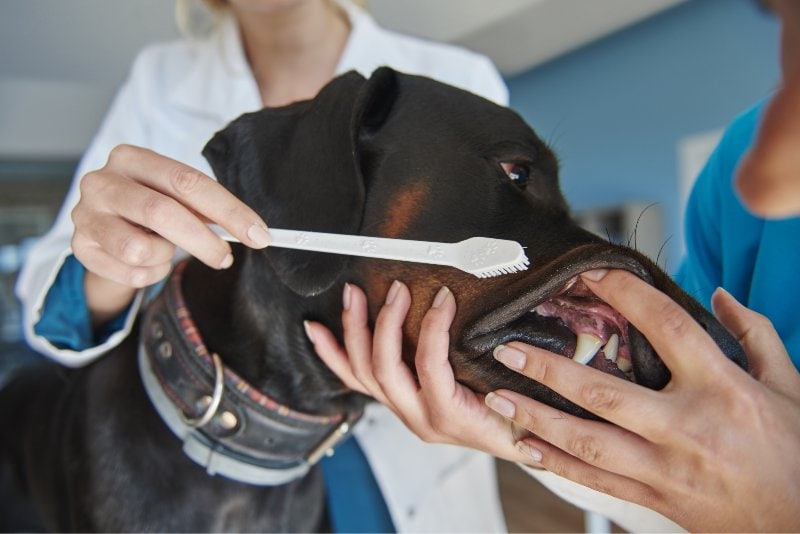
4. Depression
Dogs can experience depression just as people can, and this is usually after a loss in the form of grief. Depression in dogs can be very profound and cause appetite changes, anorexia, and other changes in behavior, leading to weight loss.
Causes of this type of depression include the loss of an owner or partner, home moves, or traumatic events. Depression can also cause other behavioral changes like apathy and disinterest in activities your Dobie once enjoyed. If your Doberman is losing weight and you’re concerned, take them to the vet to rule out any physical illness.
5. Dietary / Food Formula Changes
If you’ve recently changed your Dobermans food and they’re losing weight, it may be that they’re not eating just because they don’t like the new food. Some dogs are fussier than others, which may mean your dog doesn’t enjoy the food they’ve been given.
Sudden changes in diet can also cause gastrointestinal upset, including vomiting and diarrhea, which may mean that the dog feels too unwell or is put off eating their new food. Formula changes to their regular food can also cause your pet to eat less.
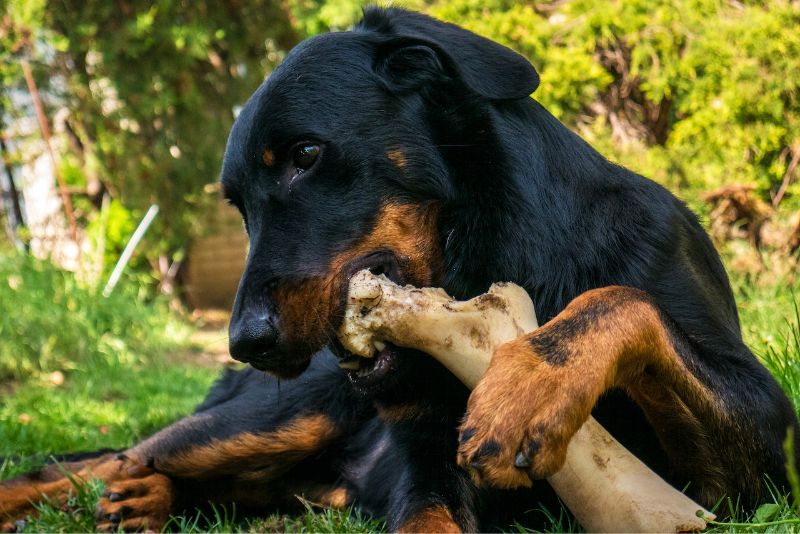
6. Worms
Infections of worms, including roundworms and tapeworms, can cause weight loss and chronic diarrhea as the main sign. Dogs get worms from eating contaminated meat or by stepping in and licking animal poop containing worm eggs.
Once infection takes hold, the worms will take nutrition from your dog’s intestines leading to weight loss and other signs of poor nutrition.
- Increased appetite
- Scooting around on their bottoms
- White segments in the stool or around the anus that look like pieces of boiled rice
7. Diabetes
Diabetes mellitus is a problem with your dog’s endocrine pancreas in converting glucose into usable energy since your dog cannot produce enough insulin. This means that your Dobie won’t be getting enough nutrition or calories. Weight loss occurs alongside other signs such as increased thirst and urination. Diabetes is a lifelong condition, but it is manageable with medication. It’s more common in older dogs, and Dobermans are not any more susceptible to it than other breeds.
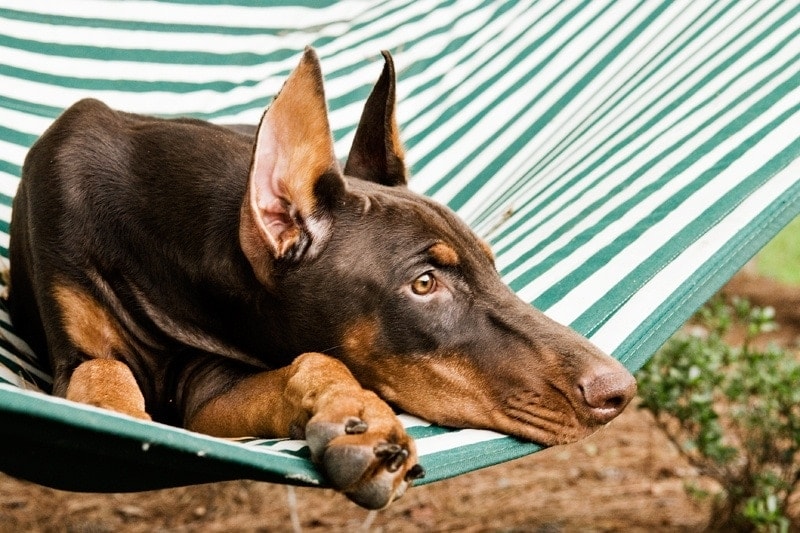
8. Lactation
Nursing dogs need an increased caloric intake due to the number of calories used to create milk for the puppies to drink. If a nursing dog isn’t given a highly nutritious diet like high-grade puppy food (which contains lots of calories for growth), she can lose weight rapidly.
She will use all of her fat stores to provide for her puppies. Whelping queens usually need around three times the amount of food they normally eat daily to prevent weight loss.
9. Swallowing or Regurgitation Problems
Mechanical problems with swallowing food, such as problems with the esophagus and tongue, can cause weight loss in Dobermans. Megaesophagus is a common condition that affects Dobermans and Labradors (among other large breeds) and comprises two parts: a dilated (large) esophagus and decreased movement of the food inside it.
These two problems combined mean that food that’s eaten and swallowed doesn’t go down but sits inside the esophagus. The food will eventually be regurgitated and will never reach the stomach for digestion, leading to weight loss.
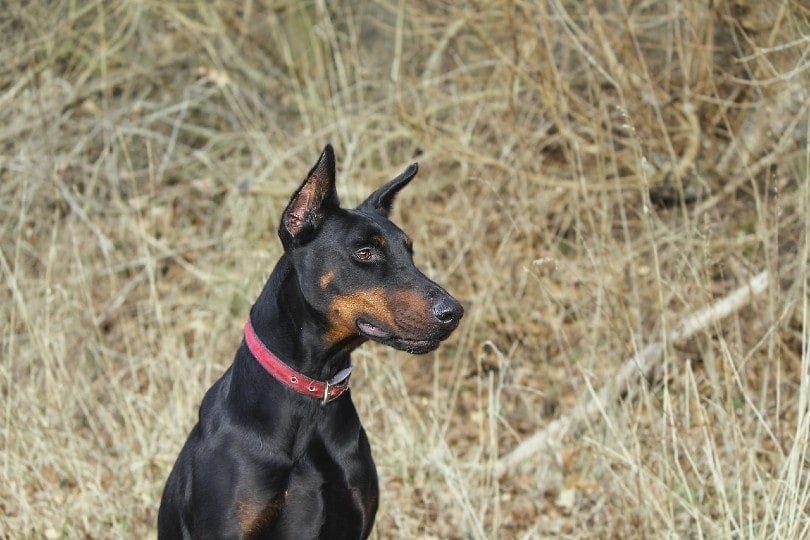
10. Kidney Disease
Chronic or acute kidney disease can cause weight loss as a sign. This is thought to be due to a few factors, such as anorexia due to feeling unwell in general, vomiting and nausea, or a build-up of waste products in the blood (such as urea) causing metabolic changes in the body.
Weight loss due to kidney disease is often accompanied by other signs such as excessive urination and bad breath.
11. Liver Disease
The disease of the liver can cause a whole host of signs, one being weight loss due to nausea, anorexia, vomiting, or diarrhea. One striking clinical sign associated with some types of liver disease in dogs is jaundice (yellowing of the skin), and other signs can be neurological (like head-pressing).
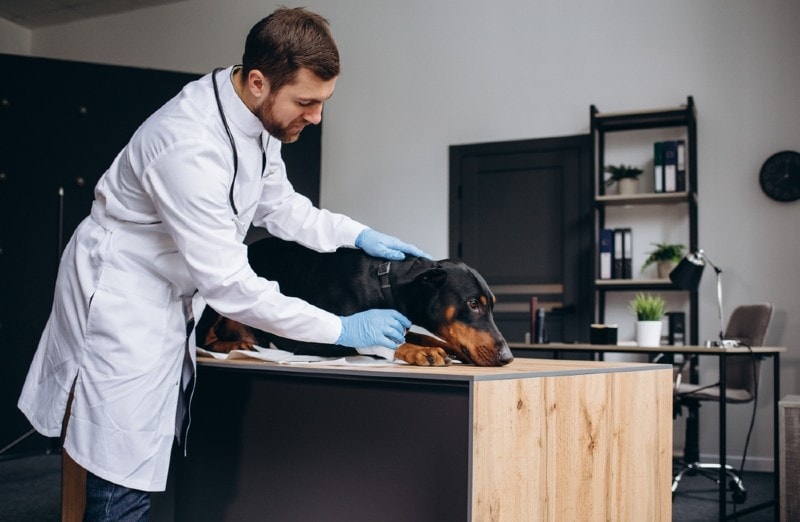
12. Cancer
Dobermans are susceptible to a variety of cancers, including mammary tumors and osteosarcoma (bone cancers). Signs of these can include inappetence, weight loss, and general malaise.
13. Anorexia Due to Pain
Many things can cause pain, and chronic pain can cause anorexia since your dog will not want to eat. Looking out for signs of pain in your Doberman if they look thinner is very important for their well-being.
If you have any worries about your dog’s pain, take them to the vet’s office immediately. The pain will have to be severe for your dog to stop eating, so don’t delay.
Should I Be Able to See My Doberman’s Ribs?
Dobermans are naturally slim and sleek, but they won’t be skinny since they’re still muscular. A body condition score chart can help you determine your Doberman’s overall body condition and how their weight is doing.
You should be able to feel your Doberman’s ribs if you run your hand over their sides and back, but you shouldn’t be able to see them. If you can see their spine and ribs, they probably are too thin, so take them to the vet for a weight check.
Final Thoughts
Your Doberman should be sleek and healthy but not skinny; if you are concerned, always take them to the vet. Causes of weight loss can be physiological such as simply not eating enough based on calories expended or related to an illness such as cancer, megaesophagus, or organ diseases. Even intestinal parasites or psychological problems can cause weight loss, so keep an eye on your dog and regularly visit the vet.
- See also: How Much Do Dobermans Weigh?
Featured Image Credit: Eudyptula, Shutterstock





